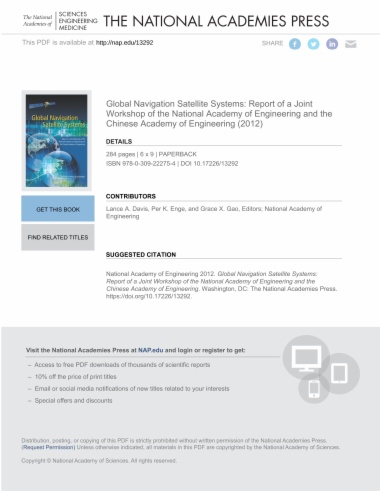The Global Positioning System (GPS) has revolutionized the measurement of position, velocity, and time. It has rapidly evolved into a worldwide utility with more than a billion receiver sets currently in use that provide enormous benefits to humanity: improved safety of life, increased productivity, and wide-spread convenience. Global Navigation Satellite Systems summarizes the joint workshop on Global Navigation Satellite Systems held jointly by the U.S. National Academy of Engineering and the Chinese Academy of Engineering on May 24-25, 2011 at Hongqiao Guest Hotel in Shanghai, China.
"We have one world, and only one set of global resources. It is important to work together on satellite navigation. Competing and cooperation is like Yin and Yang. They need to be balanced," stated Dr. Charles M. Vest, President of the National Academy of Engineering, in the workshop's opening remarks. Global Navigation Satellite Systems covers the objectives of the workshop, which explore issues of enhanced interoperability and interchangeability for all civil users aimed to consider collaborative efforts for countering the global threat of inadvertent or illegal interference to GNSS signals, promotes new applications for GNSS, emphasizing productivity, safety, and environmental protection.
The workshop featured presentations chosen based on the following criteria: they must have relevant engineering/technical content or usefulness; be of mutual interest; offer the opportunity for enhancing GNSS availability, accuracy, integrity, and/or continuity; and offer the possibility of recommendations for further actions and discussions. Global Navigation Satellite Systems is an essential report for engineers, workshop attendees, policy makers, educators, and relevant government agencies.
- Cover
- Front Matter
- Summary of the Workshop--As Reported by Grace Xingxin Gao
- Address at the Opening Ceremony of the NAE-CAE Joint Workshop on Global Navigation Satellite Systems (GNSS)--Zhou Ji
- Introductory Remarks--Charles M. Vest
- WORKSHOP PRESENTATIONS
- Development of the BeiDou Navigation Satellite System--Ran Chengqi
- U.S. GPS Policy, Programs, and International Cooperation Activities--David A. Turner
- Research Report on GNSS Interoperability--Lu Xiaochun, Lu Jun, Bai Yan, Han Tao, and Wang Xue
- The Interchangeability Problem: Signals, Coordinate Frames, and Time--Rita M. Lollock, Thomas D. Powell, and Thomas A. Stansell
- COMPASS/BeiDou Coordinate and Time Reference Systems--Yang Yuanxi, Tang Jing, and Han Chunhao
- A Global Safety of Life Service from Multiple GNSS Constellations--Per Enge
- Monitoring and Assessment of GNSS Open Services--Jiao Wenhai, Ding Qun, Li Jian-wen, Lu Xiaochun, and Feng Laiping
- Alternative Position, Navigation, and Timing: The Need for Robust Radionavigation--Mitchell J. Narins, Leo V. Eldredge, Per Enge, Sherman C. Lo, Michael J. Harrison, and Randy Kenagy
- Analysis of the GNSS Augmentation Technology Architecture--Chen Jinping
- Impact of Intentional, Low Power, In-Band, Personal Privacy Devices (PPDs) on Aviation--A.J. Van Dierendonck
- GNSS Open Signals Interference Issues and Countermeasures--Du Xiaodong, Wang Feixue, and Nie Junwei
- Present and Future Applications of COMPASS Navigation Satellite System--Tan Shusen
- Application of GNSS to Environmental Studies--Penina Axelrad
- Recent Progress on GNSS Seismology--Liu Jingnan, Fang Rongxin, and Shi Chuang
- Precision Agriculture: Opportunities and Challenges--Michael O'Connor
- Integrity Lessons from the WAAS Integrity Performance Panel--Todd Walter, Per Enge, and Bruce DeCleene
- Breaking the Ice: Navigation in the Arctic--Grace Xingxin Gao, Liang Heng, Todd Walter, and Per Enge
- APPENDIXES
- Workshop attendees [photo]
- Appendix A: Workshop Agenda
- Appendix B: Workshop Summary Record
- Appendix C: Biographical Information
- Appendix D: Acronyms

